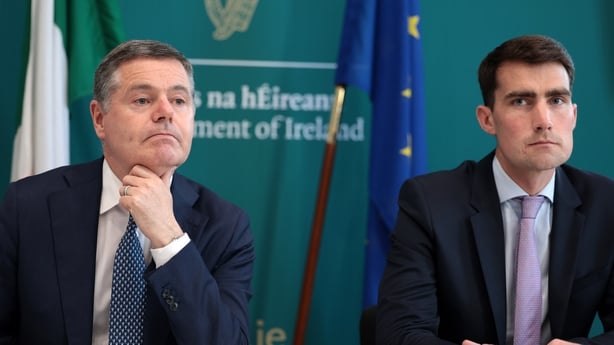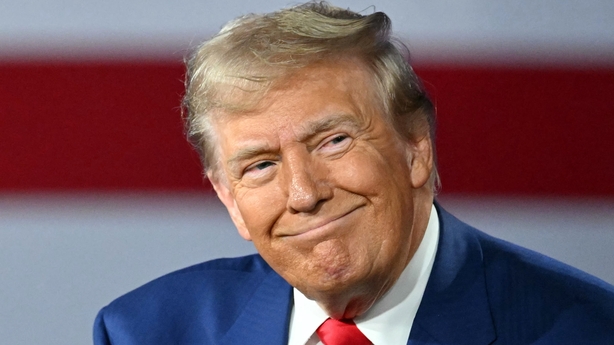Jack Chambers is simultaneously in the best and worst position as Minister for Finance.
It is the 33-year-old Dubliner's first senior ministry, and it is a heavyweight one. He is weeks away from his first budget and a general election is looming.
The stakes could not be higher.
Politically, the dynamics within Government have altered quickly in recent months.
The boundlessly ambitious Simon Harris is leading Fine Gael, while Roderic O'Gorman, newly installed as head of the Green Party, is keen to make his mark.
The recent shift in polls has also put a pep in the step of Mr Chambers’ own party leader, Micheál Martin of Fianna Fáil.
There will be intense pressures, some of which are likely to surface in the final days or even hours before the budget is agreed.
Some Fine Gael figures privately bemoan the party’s tight spending prior to the last general election.
This time there will be a strong push to give money back to voters.
Minister Chambers and Minister for Public Expenditure and Reform Paschal Donohoe have a lot of additional revenue at their disposal.
This week the latest figures showed tax collected is 12% up on the same period last year.
The stellar performer was corporation tax, now 28% ahead at €16bln.
This bonanza from tax applied to multinationals shows no sign of letting up.
Ministers Chambers and Donohoe must convince colleagues they should stick with the broad budget plan outlined earlier in the Summer Economic Statement instead of extravagance before an election.

Seamus Coffey, the new chairman of the Irish Fiscal Advisory Council, laid down some big markers this week.
He has repeated criticism of the Government for breaking its own rule limiting spending growth to 5%.
Government insiders admit this directive has backfired on the coalition.
It was intended to be used as a stick by the Department of Public Expenditure to beat the other departments with during tense budget negotiations.
But now that the Government is breaching the rule itself, others are criticising the coalition for not abiding by it.
The rule is calculated on a combination of 3% real economic growth and 2% for expected inflation.
Some economists believe cost of living increases mean it is understandable that government spending overshot the rule in previous years.
But the council argued that it has added to inflation and the coalition's own actions are now costing the average household €1,000 annually due to higher prices.
One issue everyone (even the Department of Finance) agrees on is the danger of relying on the gold rush of money from taxing multinationals.
Two years ago, 43% of corporation tax was paid by just three huge companies.
Big corporations can have highs and lows or vanish completely.
Relying on a small number of companies for a large amount of money is worrying.
The Government has announced that half of the corporation tax will now be set aside in two large funds.
But the council says all of it should be saved.
One issue of concern is what would happen in the event of a significant reduction in corporation tax.
The council said if the windfall gains were unwound and unemployment returned to more normal rates, it would result in a €10bln deficit which would require €3,600 of tax increases for every worker.
Obviously, this is a worst case scenario.
But we only need to look at the 2008 financial crisis to realise worst cases can and do happen.
There is a broader international political dynamic, too.
Donald Trump has set his sights on bringing more industry back to the US.

If he should win the White House again, it could have far-reaching implications for the Irish economy.
In the run-up to the Budget, ministers Chambers and Donohoe have been told to make the public finances more transparent.
Last year, the Fiscal Advisory Council irked the then finance minister Michael McGrath when it accused the Government of "fiscal gimmickry" for categorising some spending as "non core" but then repeatedly including it in the Budget.
While some might have viewed the council’s wording as undiplomatic, it seems to have had an effect on the Government.
It has now abandoned the phraseology of "core" and "non core" in favour of "total spending".
The other big criticism of the Government’s financial policies is that spending announced in previous budgets was far below what was incurred. Also, the statements about expenditure are murky.
Last year, as soon as the allocation for the Department of Health was announced, it was clear it would need a lot more money. It has now been given an additional €1.5bln.
Then there are items not budgeted for but incurred every year, for example the payment of the social welfare Christmas bonus.
The concern here is that spending forecasts are too low, the Government outlay is a lot more than it had forecasted, and it uses unreliable corporation tax to plug the gap.
Another key piece of information before the Government agrees the budget is how the economy is doing.
Growth this year will probably be less than last year's 5%, but the country continues to do well. Wages are up, taxes are strong and record numbers of people are at work.
As ministers get ready for the budget, many of the issues they face are good problems.
But politically and economically there is a lot at stake as Minister Chambers prepares for his first major set piece.






